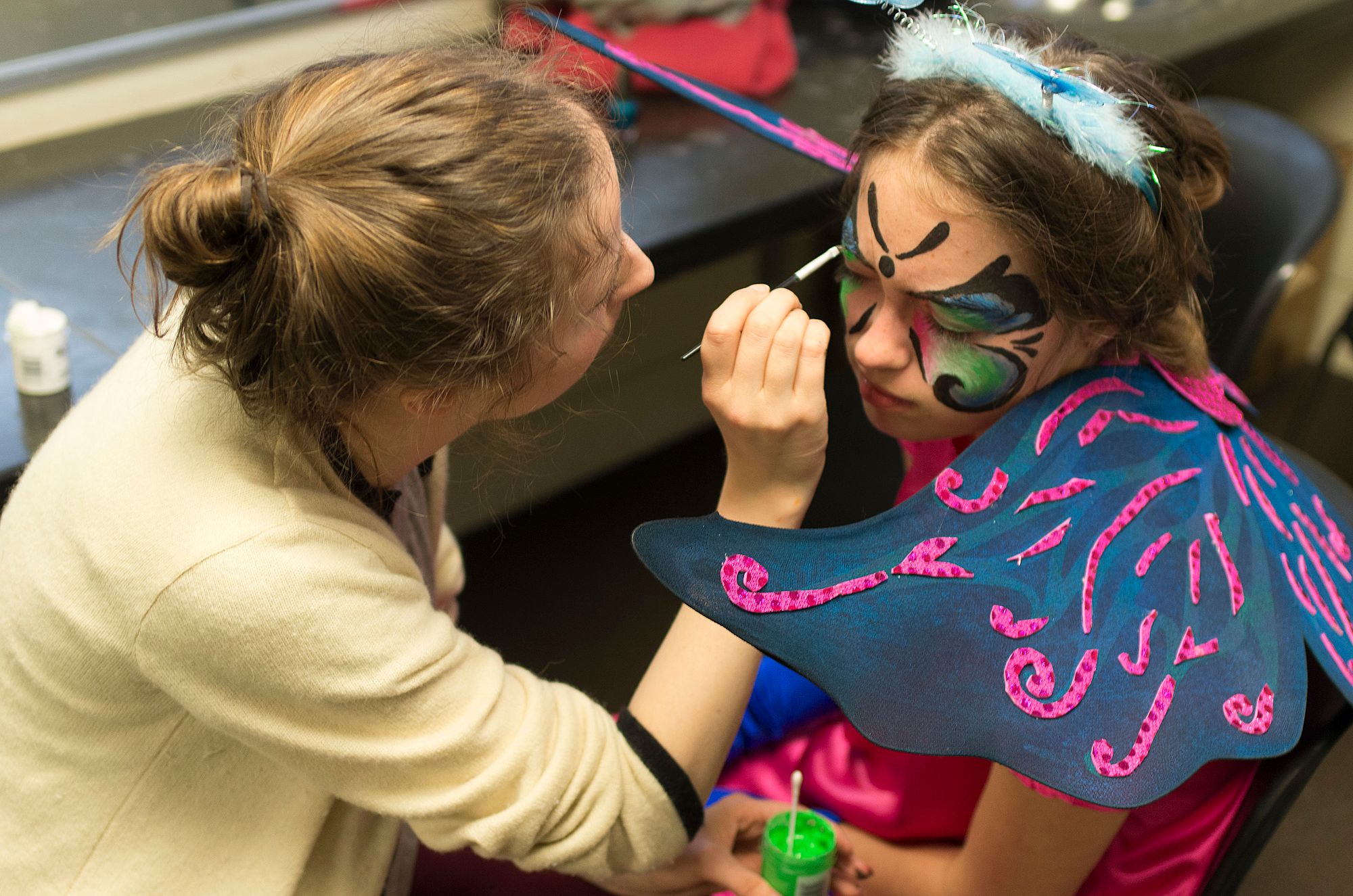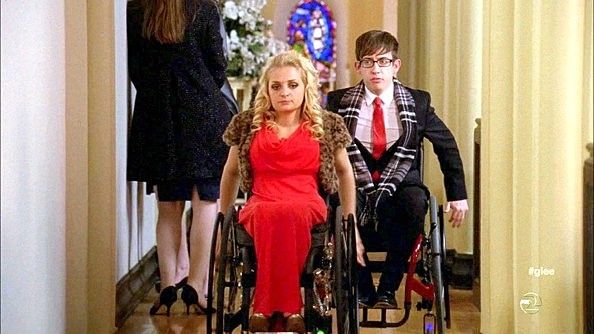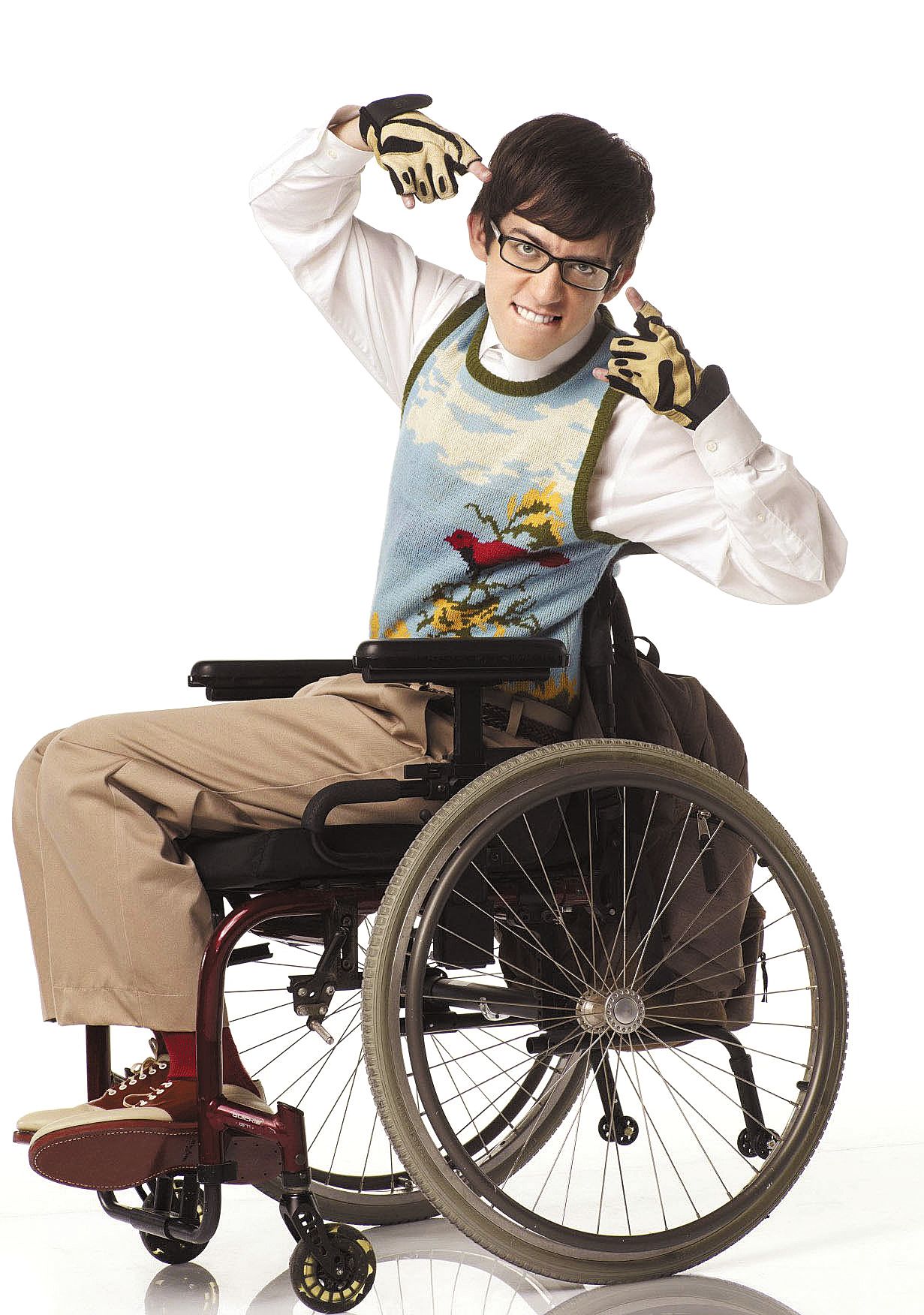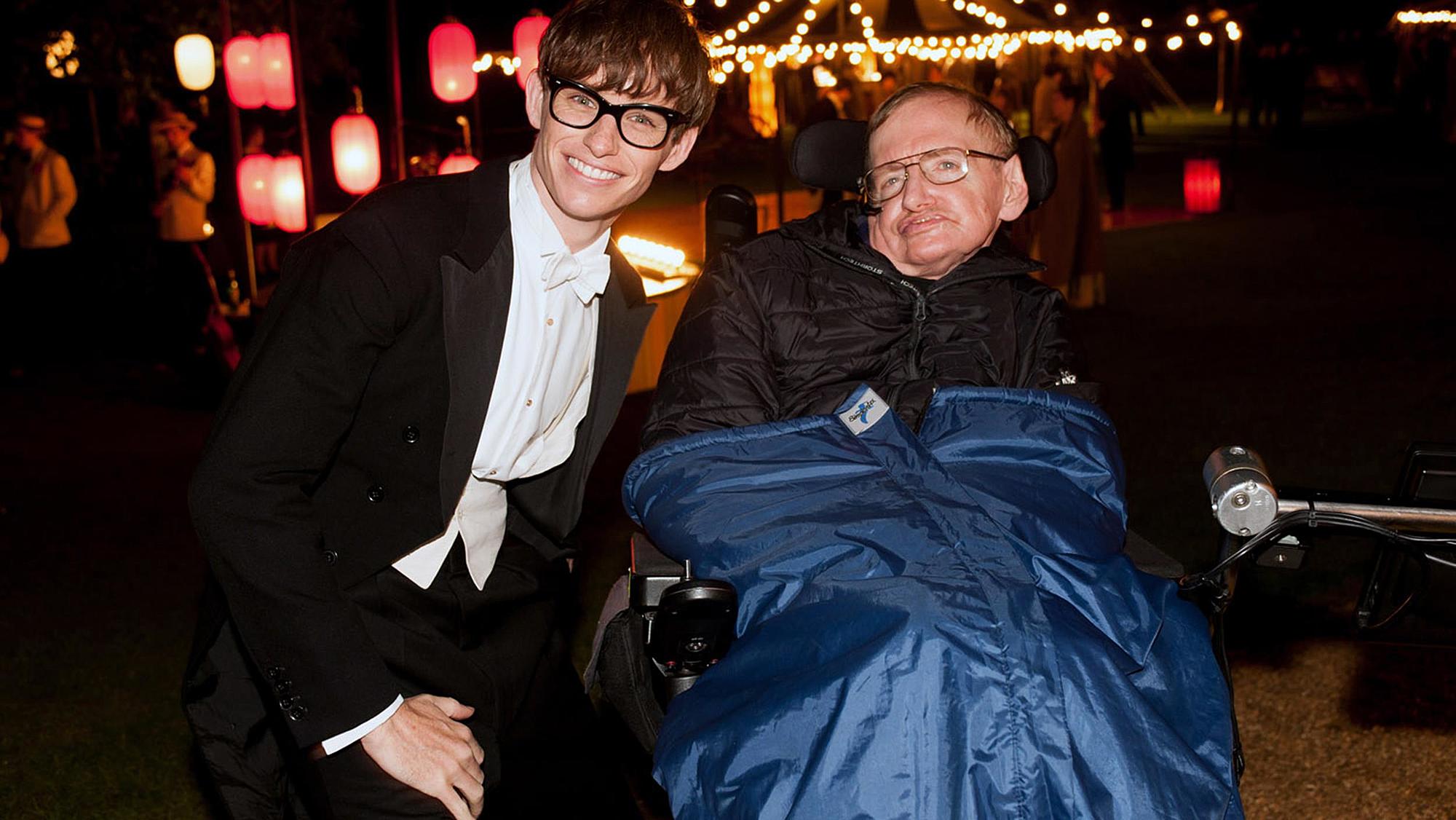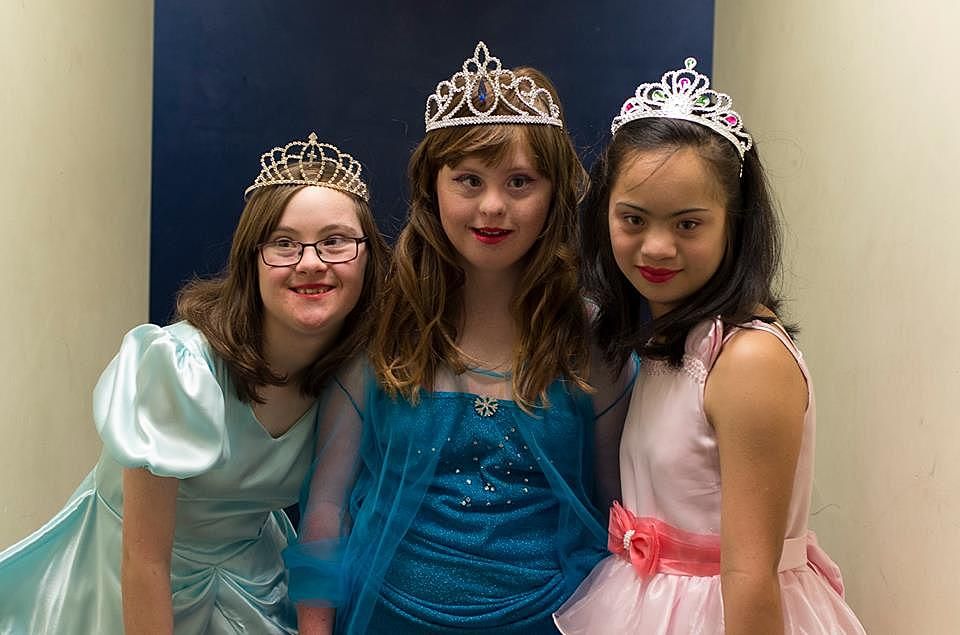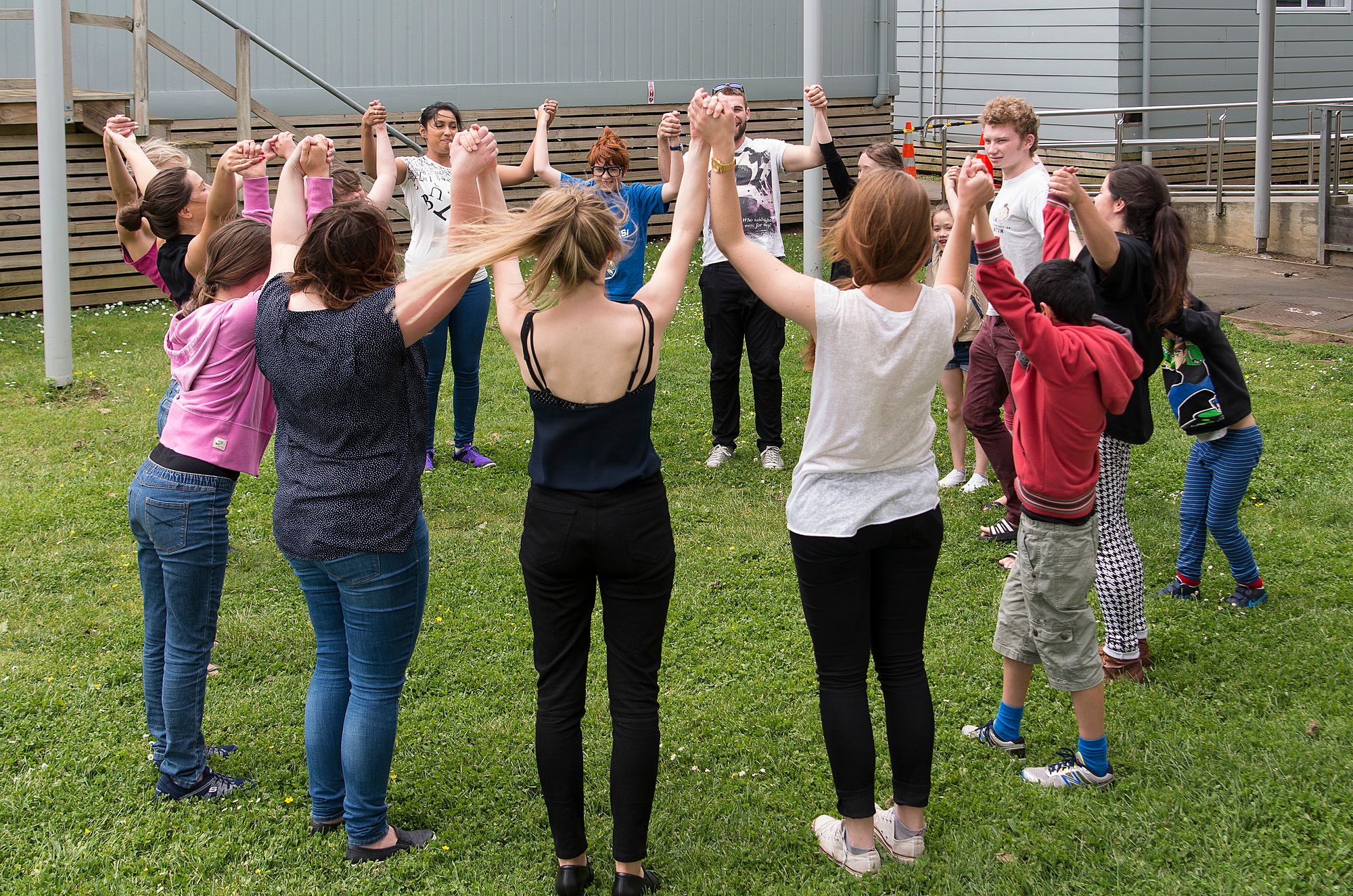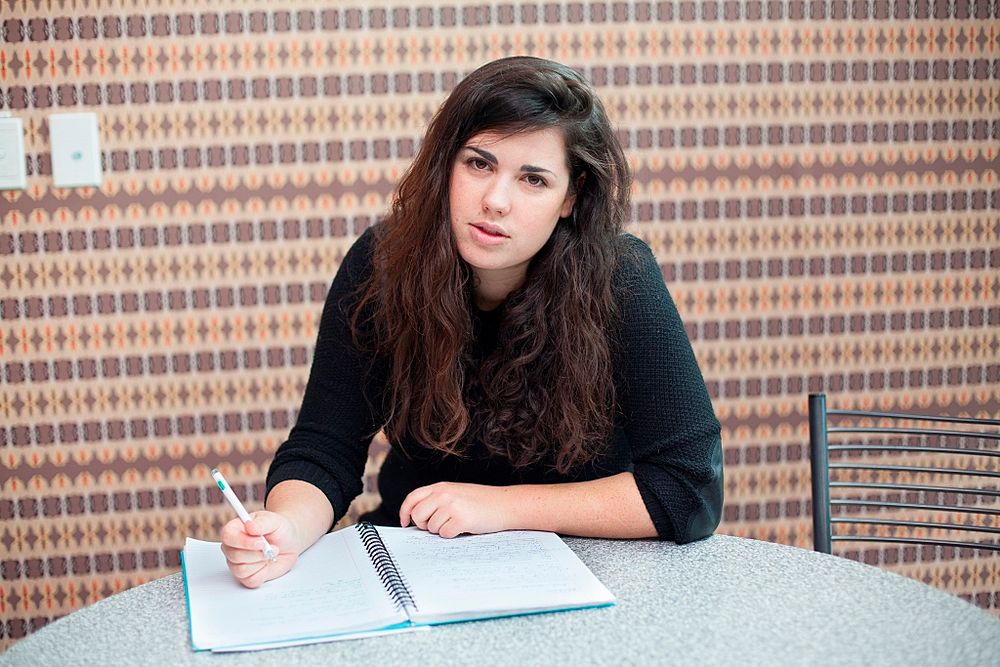Disappropriation: Cripping Up, Winning Big
Kirsti Whalen on the representation of disability in the media.
Archie’s gangly fingers gather the air in excitement. It’s a private joy that he sketches with the cadence of a tambourine: everything shimmering into fruition. He leaps, and his heavy boots thud onto the floor of the performing arts center. His wig is askew.
“I did it,” he says, and his classmates, his admirers, echo the sentiment. I can hear kids screaming “I did it” to their parents all around me, the words slurred and muffled; bold without volume control.
Their faces are smeared with paint and sweat from the theatre lights. My arms are tired from carrying a scared little boy around all day. Though frightened by the props and the shadows of the stage, he finally came to life as the scary forest’s werewolf, once the audience roared its approval. At the end of the show he performs solo to “Gangnam Style”, and through the cans, I can hear the sound tech screaming “This kid! This kid!”
The audience cheers because the kids are, genuinely, brilliant. Unlike the special clap for the special kid I’ve seen too many times, these little stars are being celebrated for their intrinsic ability. And I’m proud to be their teacher; proud because they worked hard, and they won this applause over weeks of line-learning, blocking, boogie-downing and anxiety. As a drama teacher for kids with disabilities, for the wonderful non-profit Acting Up!, the ultimate reward is seeing them on stage, fumbling a silly play and improvising through the gaps as happily as their mainstream contemporaries.
Three months later, Eddie Redmayne walks onto stage at the Oscars and accepts the best actor award for portraying Stephen Hawking in The Theory of Everything. The best actress award is presented to Julianne Moore for her performance of the progression of Alzheimer’s. A month after that, Glee’s Kevin McHale jumps out of his character Artie’s wheelchair to perform one episode’s dance routine in a fictionalized Heaven. The ideal in paradise is, apparently, able-bodied.
One day, I tell an acquaintance I work with kids on the autism spectrum and she says “oh, like Rain Man”, referencing a character Dustin Hoffman won an Oscar for almost twenty years ago. I want to say no. I want to be honest and say the kids I care for are not savants and express behaviour that on some days is challenging and other days violent. I want to say that they’re funny and vibrant and sing incessantly and cry at the idea of being left out of an adventure. But I don’t – Rain Man is the easy reference. It seems we only have space for one.
Diversity might be a popular cache in the modern media, but it looks pretty different from the inside. While I understand that actors exist to portray someone that they are not, I wonder when the kids I teach will be auditioned to fill such roles. Barring the odd and glaring exception, we drew a line in the sand when it comes to blackface a while ago, but actors are still cripping up and being lauded for it. If the talented kids I know auditioned for parts that actually reflected their disabilities, it seems they wouldn’t stand a chance.
I speak to Glee actor Ali Stroker on a sunny afternoon in both Auckland and Los Angeles, where she lives and works. Even across Skype’s pixelated distance her energy is visceral, and as a fan of the show, I’m slightly overcome. I used to watch Glee with a girl I supported after school, whose cerebral palsy offered certain limitations but never stopped her from being a skilled dancer. Something about the show spoke to her pre-teen sensibility -- the love affairs and the falling grades; the mean girls and the gorgeous guys -- but I think the extent of the inclusivity spoke to her too.
Stroker was a runner up on the second season of The Glee Project, a reality show in which actors vie to be a member of Glee’s cast. Despite coming second to a sweet, gangly and well-trained young man named Blake Jenner, she still scored a role on the show opposite McHale’s Artie. For one episode she was Betty, the sexy, haughty love interest.
Ironically, Stroker’s mobility was compromised in a car accident in her youth, which mirrors Artie’s storyline exactly. Stroker, however, is a wheelchair user in her daily life. McHale is not. And although Stroker is thankful to the show’s creator, Ryan Murphy, for writing a role that has changed her career, her stance on the appropriation of disability is clear. “You wouldn’t put a kid in Blackface on Nickelodeon,” she says. “It’s 2015. So why is this still happening?”
It’s easy to criticize those taking risks. Glee has certainly come under plenty of fire for its disability representation. Sometimes the show gets it really, really wrong. But while the diversity (or, perhaps, DIVERSITY!) of Glee is dripping in tokenism, it’s also one of the only popular shows in which kids come together regardless of their gender, sexual orientation, ethnicity or ability. In a recent episode, titled “Transitioning”, a 300-strong choir of transgender people belted out Queen Latifah’s I Know Where I’ve Been, and I’ll admit it was a tearjerker. The previous season, Artie left for college and contracted an STD, a rare nod to the fact that people with disabilities and sexuality are not mutually exclusive. The show’s creator, Ryan Murphy, is also behind campy anthology series American Horror Story. This show features Jamie Brewer, an actor with Down Syndrome, in different roles across its different seasons, but does not dwell on her disability after her role as Adelaide Langdon in the first season – she’s a genuinely integrated member of the cast, and it’s exciting to see.
Times change and gestures date. If, in years to come, casting ceases to be a market in which bigotry is bought and sold as advertising and there’s a commitment to authenticity in auditioning, Murphy’s efforts will come to be seen as rudimentary at best and brutally offensive at worst. But it’s important to make space for the imperfection of a burgeoning discourse, and the reality of the disability world is that there is no rulebook.
The community itself is divided – do we celebrate difference or integrate it to the point of invisibility? I know people with disabilities who are proud when they are called brave, and others who detest the term. Do we say people with disabilities or disabled people? There are different camps, often in conflict. The fact that we have umbrella terms for Autism Spectrum Disorder or Cerebral Palsy reflects the extent of the diversity within a minority presented as singular, and it’s not going to be easy to get representation right.
But even as all of this is negotiated, there’s still a fundamental caveat: aren’t the right people to ask those who own the shoes we’re trying to walk in? Aren’t the right people to tell these stories the people who’ve lived them?
Aren’t disabled people the right people to portray disabled people?
The term cripface is derived from blackface. The leap is not so hard to make. I was once accused of lumping ableism together with racism, the implication being that nothing, ever, could be as extraordinarily offensive as the former. Perhaps this is true. But what I fundamentally object to is the dehumanizing of a person, for any reason. And I believe that disabled people are still, in far too many contexts, treated as something other. Something less. And, thus, something to be appropriated.
Furthermore, there’s a paternalistic thread of the “noble savage” to disabled peoples’ portrayal, in that those who have lived the stories are not trusted to tell them, but those who haven’t and do tell them are rewarded. Sixteen percent of Academy Awards for best actor or actress have been for portrayals of disability and mental health. While it’s true that this figure is somewhat representative (19.3% of the American population have disabilities), the industry numbers simply don’t add up. Only 41 American films featured a disabled person, meaning onscreen for more than ten minutes, between 1962 and 2003, compared to the 217 on a list of American films produced in 2003 alone. Disability is still considered so unusual and so very, very brave that it seems almost every portrayal is glorified.
Certainly, some actors deserve their praise. Although others within the disability community may disagree (and are entitled to do so), I consider Redmayne’s performance as Stephen Hawking one such example. He spent time with people with ALS as well as Hawking himself and delivered an incredible performance.
His casting is more difficult to place at the center of this debate as the role called for a demonstration of the progression of ALS, a challenge perhaps insurmountable for someone with the condition. The same could be said of Julianne Moore’s role as Alice Howland, though perhaps both performances merely highlight the limitations in narratives that need to show aging, maturation and deterioration (at times concurrently). We are, however, willing to suspend our disbelief when a child and an adult are cast to play the same character over time. With the notable exception of Boyhood, we know these people are not the same, yet embrace the narrative.
Crucial to Redmayne’s case is an added layer of authenticity – Stephen Hawking is a living person with the autonomy and ability to both allow the film’s inception and to respond. According to Variety, Hawking communicated that, at times, the likeness was so great that he thought he was watching himself, and that the work was ‘broadly true.’ I question whether this same opportunity would be possible for someone on the severe end of the autism spectrum, or someone whose Alzheimer’s disease has taken full grip of their capacity for recollection.
Crucial, also, is the framing of Hawking’s disability – Redmayne played a person, not a condition. The film was an ode to love rather than a funeral march toward loss of function - at the forefront of its plot were a relationship and an incredible intellect. I also appreciated the frank portrayal of what it means to love someone who needs continued medical assistance. The voice of the caregiver is often lost in the disability debate, due, in part, to the term being perceived as disempowering for those who require or desire said care. Felicity Jones, as Jane Hawking, confesses, “I tried my best” in the couple’s painful parting. Jones’s steely strength results in a nuanced exploration of an otherwise tired motif – the wonder woman behind the publically lauded man.
Nonetheless, The Theory of Everything highlights the fundamental gaps in the general perception of disability that the media offers. Philip Patston, an Auckland activist and actor, advocates that improved treatment of disability on screen could start with the obvious - disability. He speaks of crowd scenes as obvious opportunities for inclusion, as all the while those casting agents that do commit to having a diverse range of people on their books are met with a lack of opportunities for these people to be cast.
“The only time we see disabled people on TV and in film is when they’re playing characters whose story is about their disability,” Patston tells me. “The other portrayal we’re seeing is that documentary, stock standard ‘here’s John, he’s a disabled person, here are all his problems and this is how he overcomes them. Isn’t he great?’ style. Or the news, and it’ll be either a tragic story or a traumatic story or a triumph. We don’t have a balanced portrayal.”
Patston has cerebral palsy and has been cast in a number of parts, including an acclaimed Shortland Street role in 1999. Like Ali Stroker, his advice to disabled actors is to train, network and be the best actor for the part, whether you’re sitting or standing.
While I admire and understand this attitude, I wonder how far it can really take us. For a wheelchair user who can speak, or a person whose speech, while limited, is still perfectly intelligible, networking is possible and training is offered. For someone whose limitations are far more severe, however, such opportunities become fewer.
People who can advocate for themselves do face challenges but, like Stroker and Patston, can find a way to prove their worth. But there must be a voice for those who don’t have one. And so many don’t. Physiologically or sociologically, I have friends whose right to speak has been denied. Whose positions as human have been negated. In a genuinely equal society, there must be space for those who don’t have the voice or the platform to make themselves heard.
Theirs are the stories I’m not sure audiences are ready to receive. The kid with autism so severe he self-harms constantly, his fingernails torn by escape attempts from any room he’s in. The child who smears feces across her walls upon rising each morning and the child who defecates into her hand on bush walks, and then throws said defecation at random passers by. The child whose anxiety leads him to attack other children; who is so anxious that he can’t learn or even leave the house. It’s one thing to challenge the idea of the lovable kid with Down Syndrome but it’s another altogether to discuss the implications of a life bottled within four walls, without help or options. We’re ready to be inspired by a disabled character overcoming their circumstances but not ready to be challenged by the perpetuity of what some people and their families face. It’s not enough.
I want to see the mothers scrubbing shit from their walls with raw hands. I want to see communication systems failing and succeeding and failing to be heard. I want to see bleeding welts on a child’s head, inflicted with his own fist in his frustration to be understood. I want cars to be torn apart by tiny hands on film and to see the bruises inflicted on carers from books, drink bottles, shoes – anything at hand that can hurt.
Because maybe then people would start believing me. Maybe the parents who take their kid down to the funding offices halfway through the school holidays, push their baby through the sliding doors and run wouldn’t come to the point of surrender. I believe that people are capable of surviving more than we can imagine. I have also seen people come to the end.
I’ve seen a sister watch a brother die of a degenerative condition she, too, has. I’ve seen a non-verbal man scream silently in pain and begged a doctor to help him, only to find that without sound, there is no suffering. These people do not exist for our inspiration. But visibility seeds advocacy and in a society that claims to be progressive we’re too far behind.*
Last week, I climbed Mount Wellington with the seven year old I work with now. He’s on the autism spectrum and has significantly more energy than my unfit self. Combined with his childish lack of fear, he sped away from me up a steep path to the summit, while I clung to the roots of the grass and trembled at every passing gust of wind.
This kid, whose language is limited and who as yet doesn’t respond to cognitive testing, climbed back down the mountain. “Come on Kirsti,” he said. “Let’s do it together.” I’m certain he was quoting a YouTube video or app, which is his general mode of self expression, but he was able to contextualize the language and add my name to suit the situation.
I’ve looked after a whole lot of kids in my time, neuro-typical or otherwise. Not one of them has extended a hand to me when I’m struggling the way this little boy did. We climbed the damn mountain.*
What’s the answer? If it’s to hire an able-bodied actor to carry these stories then there’s something wrong. Because if a set isn’t wheelchair accessible, autism-friendly, patient or kind then the actors on set shouldn’t have the right to tell stories about wheelchair users, autism, patience or kindness. If a production won’t make the effort to accommodate disability, they should not be lauded for its representation. If it takes too long to get a line of dialogue out of someone with autism, maybe the line isn’t one that they would deliver in the first place. If speech is too slurred to be understood, is a slightly more passable affected slur from the mouth of a cripped-up able-bodied person really the better option?
Is this really so dissimilar from a racist production team deigning to create a civil-rights epic? The excuse that the talent doesn’t exist is simply untrue. So we’re left with the reality that it’s too hard. The capital gained from a fraudulently disabled character is not worth the investment, and thus our praise is empty. Meanwhile, those with real disabilities will receive our pity, whether they want it or not.
“When someone comes up and asks me why I’m in a chair,” says Stroker, “it’s like someone asking what size bra you’re wearing. But being in a chair is not something you can hide. Usually when people ask and I say I was in a car accident when I was young, the response is ‘I’m so sorry’. And that moment is my moment to respond in an authentic way, and my response is ‘actually, there’s nothing to be sorry for. I have an amazing life and I get to experience the world in a different way and that is a gift.’
“People see disability and immediately feel bad. What is that? To me it’s a weird ego thing, like, ‘I’m more fortunate’. And who’s to say that your life is better? You’re making a pretty bold assumption that because you can walk your life is better. And to see someone with autism and think ‘oh, that’s tough’. Is it? Is it tough? That’s a bold assumption to say that the way they communicate is not as good as the way we communicate. For me, disability is the most powerful reflection of human ability. If we take the fear out of it then how do we see it?”
How I see it is through a room full of proud kids and parents, fizzing with achievement. It looks like kids who can remember lines and who are more than capable of carrying and sustaining the emotion to match them. It looks like three little adventurers remembering to creep through the scary forest, and a butterfly flaunting her killer dance moves. It looks like a place in which people get to be people, without second looks or commiseration.
Before I finish talking with Ali Stroker, the kids I care for run into the room. AJ ties himself around my neck and says “hi” into the ether, too shy to actually greet the screen. George dances a little and then exclaims “Let’s check it out!” painting some image across the air. “Ali is a singer and a dancer,” I say, and George walks off bopping to his own beatbox, grooving to his killer rhythm.
“These are superpowers,” Stroker says. “These are incredible ways of experiencing life.”
I want the talented kids I know to grow into a world in which they are offered the chance to tell their own stories. They earned the right. If they have the skills, then the media has the responsibility.

